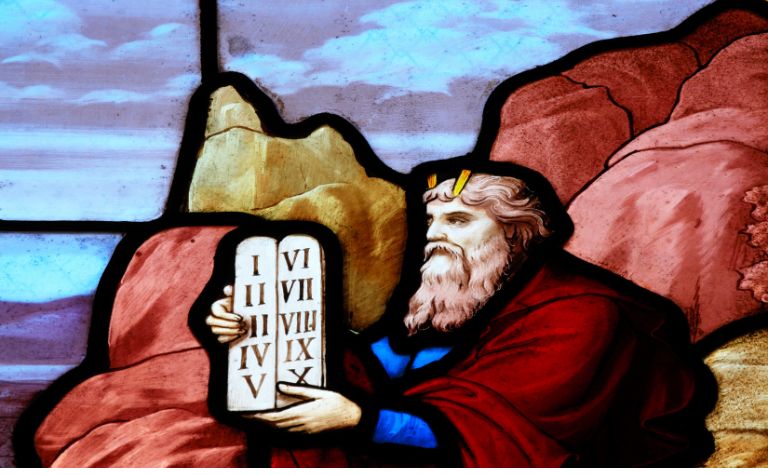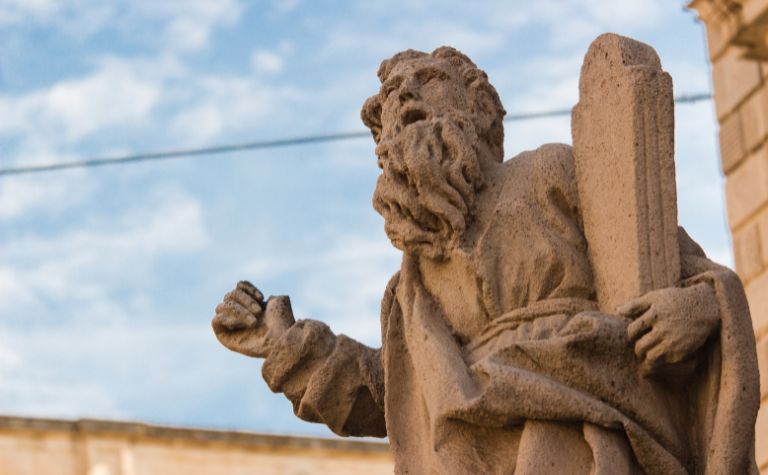Moses didn’t live to experience the culmination of his life’s work. He led his people out of slavery in Egypt, then through wandering in the desert for 40 years and eventually to the brink of the Promised Land. While Moses saw Canaan, the land of milk and honey, from afar, he died without stepping foot in it.
The description of Moses’ death in the book of Deuteronomy has resulted in various interpretations among scholars. Some believe he died of old age; others argue that details in the passage refute that idea. Yet, a traditional Jewish interpretation of the text is that God gave Moses “the kiss of death.”
How does the Bible describe Moses’ death? What does Deuteronomy reveal about his physical health that adds to the mystery of how he died? How does Moses’ obituary compare to others like Abraham’s? What are the arguments for and against him dying of old age? What is the kiss of death? Keep reading to learn the answers to these questions and others.
Also, the record of Moses’ death includes an obituary-like description in Deuteronomy. Learn how old Moses was when he died and other details about his death to get more insight.

The Last Day of Moses’ Life On Earth
Faithfulness to God defines Moses’ legacy in the Bible (e.g., Heb 11:23-29). Yet he was a human being that made mistakes. At the end of his life, God graciously allowed Moses to see the Promised Land before he died, even though he wouldn’t live there because of a previous act of disobedience (Num. 20:10-13).
As Moses gazed over the land from a far-away mountaintop, God said, “This is the land of which I swore to Abraham, to Isaac, and to Jacob, ‘I will give it to your offspring.’ I have let you see it with your eyes, but you shall not go over there” (Deut. 34:4, ESV; cf. Gen. 12:1-3).
Then, at 120 years of age, Moses died (Deut. 34:5-7). He often evaded death during his life, demonstrating God’s sovereignty over his life and ministry. Yet, at the end of his time on earth, God exercised his sovereignty again, overseeing his last day of life and caring for his body afterward.
Questions About How Moses Died
In the view of some readers, the manner of Moses’ death in the passage is ambiguous. “So Moses the servant of the Lord died there in the land of Moab, according to the word of the Lord” (Deut. 34:5).
Though the verse clearly shows Moses died, many wonder how he did. And what does it mean that his death was according to the Lord’s word?
The next verse doesn’t clarify the manner in which Moses died but leads to a different question: “And he buried him in the valley in the land of Moab opposite Beth-peor; but no one knows the place of his burial to this day” (Deut. 34:6).
Many readers wonder who “he” is in the phrase “and he buried him” (emphasis added). Wasn’t Moses alone on the mountain? Most Jewish and Christian commentators believe that “he” refers to God.
Comparing Abraham and Moses’ Obituaries
It’s revealing to contrast the description of Moses’ death with Abraham’s. Genesis 25:8 reads, “Abraham breathed his last and died in a good old age, an old man and full of years, and was gathered to his people.” In other words, Abraham died of old age.
The next verse explains that his sons, Isaac and Ishmael, buried him, providing readers with the precise location, i.e., the cave of Machpelah, in the field of Ephron the son of Zohar the Hittite, east of Mamre” (v. 9).
The precise location of burial is left out of Moses’ obituary. Why? Though the passage doesn’t explicitly state the reason, some scholars speculate that the Israelites would have wanted to carry Moses’ body into the Promised Land, violating God’s plan.
Also, Moses’ family plays a vital role in his story. Many readers want to know who Moses’ wife was to understand him better.

Did Moses die of old age?
According to some Jewish interpretations, like The Testament of Moses (circa 6th century A.D.), Moses died of old age. [1] Some modern Christian commentators agree that the passage doesn’t reflect an abnormal death as is reflected in “the kiss of death” interpretation (more below).
For example, The IVP Bible Background Commentary reads, “Deuteronomy makes it very clear that he died, and there is nothing remarkable in the account.” [2] However, for many readers, other details in the passage suggest that Moses didn’t die of old age.
After revealing that he was 120 when he died, the obituary-like description says, “His eye was undimmed, and his vigor unabated” (Deut. 34:7b). Another translation reads, “yet his eyesight was clear, and he was as strong as ever” (NLT). To many readers, this description doesn’t suggest that Moses died of old age.
Regarding the description in verse seven, Deuteronomy commentator Eugene H. Merrill explains, “In other words, he did not fail to enter Canaan because he died, but he died because he failed to enter Canaan.” [3] However, Merril doesn’t argue for or comment on “the kiss of death” interpretation.
Also, names often have special meanings in the Bible. Discover what Moses’ name means for more understanding of his story.

What Is the Kiss of Death?
The phrase “the kiss of death” comes from the description in Deuteronomy that says Moses died “according to the word of the Lord” (Deut. 34:5, ESV). Some readers believe the phrase refers to when God told Moses he would die and not enter the Promised Land. In this interpretation, the phrase communicates that Moses died like God said he would (cf. Deut. 31:14).
However, others point out that the Hebrew word translated as “word” (peh) in popular English translations of the verse means “mouth,” though it can also mean “word” as in speech.
The Brown-Driver-Briggs Hebrew and English Lexicon explains that it means the “organ of eating and drinking.” [4] In the NASB, the Hebrew word is translated as “mouth” 275 times and “word” seven times.
Based on this imagery, a Jewish tradition arose that God ended Moses’ life with his mouth. According to one proponent of this interpretation, “At the end, God leans down from the heavens and ends Moses’ life with a soft, gentle kiss.” [5]
Christian commentator Matthew Henry refers to the divine kiss in explaining the passage. “He dies according to the word of the Lord. At the mouth of the Lord; so the word is. The Jews say, ‘with a kiss from the mouth of God.” [6]
Also, Moses’ birth story is one of the most unique in the Bible. Because of this, many readers of Exodus want more understanding of who Moses’ father was. See the article to learn more.
References:
[1] The Testament of Moses
[2] The IVP Bible Background Commentary: Old Testament. p. 208.
[3} Deuteronomy by Eugene H. Merrill. New American Commentary. p. 454.
[4] Bible Hub
[5] My Jewish Learning
[6] Matthew Henry’s Commentary. p. 209.
Related Questions
Moses had one of the most interesting families in the Bible. He was born to Hebrew parents, yet the Pharaoh's daughter raised him. Moses' siblings, Aaron and Miriam, played critically important roles...
Bible readers remember Moses for learning God's name through a burning bush, parting the Red Sea using God's power, and receiving the 10 Commandments from God on Mount Sinai. He is also known for...
